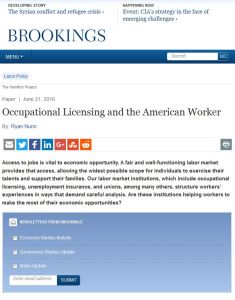Join getAbstract to access the summary!

Join getAbstract to access the summary!
Ryan Nunn
Occupational Licensing and the American Worker
Brookings Institution, 2016
What's inside?
Licensing requirements have both benefits and drawbacks for American workers and the economy.
Recommendation
The US Bureau of Labor Statistics reports that almost 25% of employed Americans in 2015 required licenses to work in their chosen occupations, up from 5% in the 1950s. In this fresh look at the US labor market, economist Ryan Nunn reports on the scope and impacts of licensing, a requirement with both negative and positive implications for individuals and the overall economy. getAbstract suggests this instructive article to employers, employees, and those looking to understand how licensing shapes the US workplace and the economy.
Summary
About the Author
Ryan Nunn is a policy director with the Hamilton Project at the Brookings Institution.























Comment on this summary